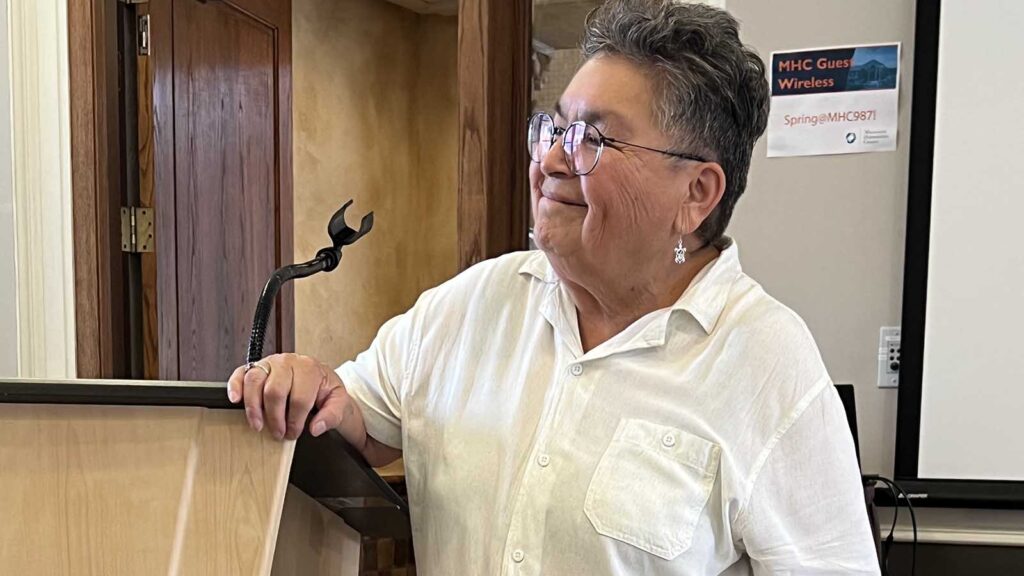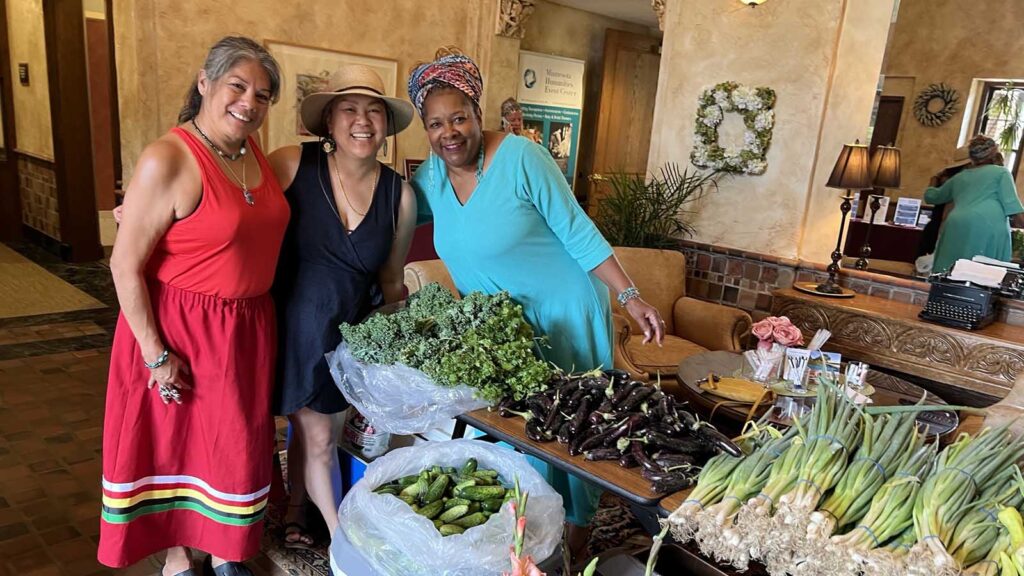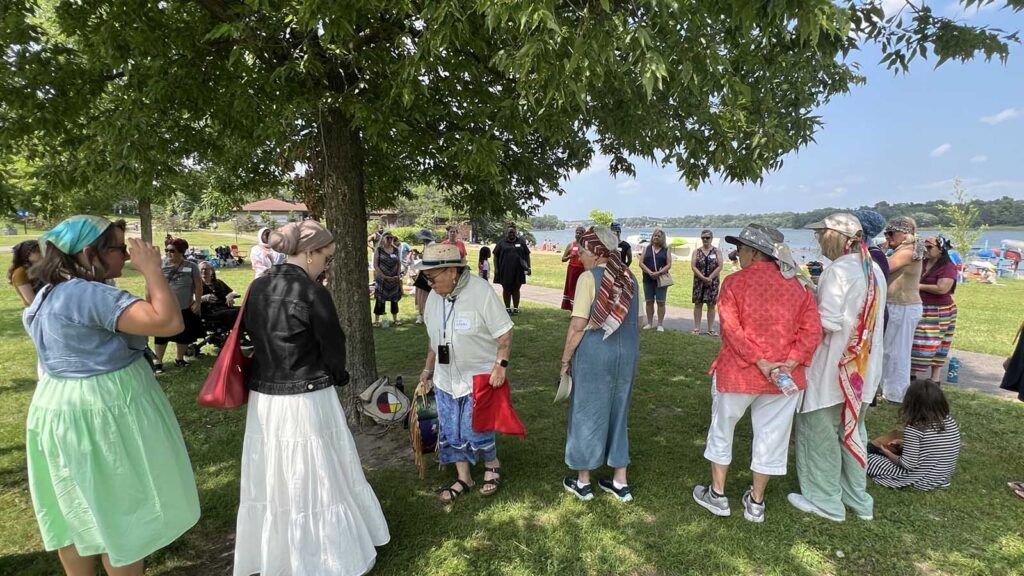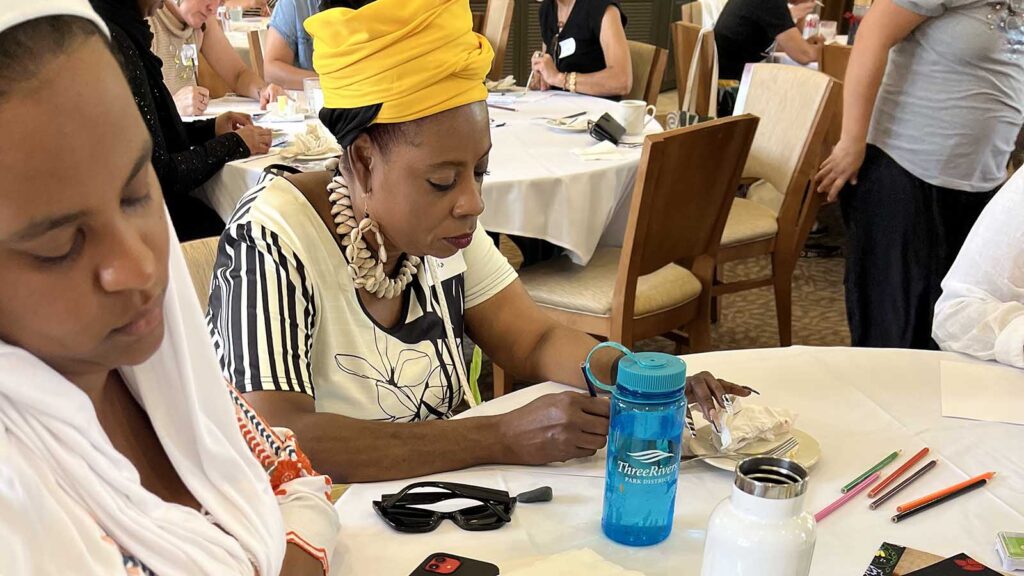Each of our Headscarf Story Circles has created a welcoming space where women of all ethnicities, religions, and ages come together in unity, connected by the shared significance and complexity of the headscarf. Metaphorically, each thread of the headscarf is intricately woven to form a profound tapestry, symbolizing our beautiful and shared commonality.
We live in a world of complexities that range from racism, reproduction rights, war-torn displacements, and more. These atrocities, often embedded through generations of trauma, leave us grappling with how to heal and move forward. Yet, amid these challenges, we witness countless acts of kindness, progress in social justice, strength of communities, and movements toward unity. The resilience of the human spirit, the power of community, and the pursuit of equality and compassion continually inspire hope and pave the way for a brighter future.
A wonderful example is reflected in our December 2023 Headscarf event. Malika Dakir, Executive Director of Reviving the Islamic Sisterhood for Empowerment (RISE), stated: “The decision to hold the Headscarf Story Circle Gatherings on a Sunday so that Jewish women could participate was a testament to the spirit of inclusivity and compassion that defined the gathering. In a time when Muslim and Jewish communities are often pitted against one another, the Headscarf Story Circle provided a space where we could come together, be vulnerable, and hold space for one another”. In a world where division often seems more prevalent than ever, events like these highlight the power of unity, the strength of community, and the essence of our shared humanity. (WCCO feature)
During our most recent Headscarf gathering in July, we hosted a modified version of the Nibi Walk which means water. Sharon Day, Executive Director of Indigenous People’s Task Force guided 33 women and girls on the sacred ritual which not only paid tribute to water but also offered each participant a chance to focus on her own inner peace, emotional healing, and a spirit of sisterhood connectedness. Despite the 90-degree temperature, everyone was thoroughly invigorated by the 5-minute walk from the Minnesota Humanities Center (MHC) over to Lake Phalen.

Before we left MHC, the lobby was a live farmers market and little library with complimentary fresh vegetables and flowers provided by Friendly Hmong Farms, and a wide variety of free books provided by Indigenous Little Free Libraries.

Once we arrived at the lake, a perfectly located Innova tree was waiting just for us. We then circled underneath its heart-shaped leaves that offered frequent cool breezes. We were so comfortable, none of us had a chance to even think about the heat. Elder Sharon walked down to the lakeside, blessed the water, filled her pail, and returned to our circle. We listened to the sacred songs while in silence reflected on our desires, and from the Four Directions spoke out loud our prayers for healing and peace.

When we returned to MHC, the reflection prompt was to write a love letter to any body of water we felt a need to connect. Prose and poetic expressions were astonishing such as Wendy Goldberg’s:
Dear Cedar Lake, you may think you’re the poor stepchild to Bde Maka Ska, Harriet, and Isles, but I see you. I ski on you in snowy winter, taught my dog to swim in you, jump in the hole in the winter, walk and bike the paths around you, paddleboard across you, and believe the sunsets over you are the most beautiful in the world. Stay healthy and lush, cool in the summer and strong with ice in the winter. Thank you for being you. Wendy.

Julia Freeman, Voices for Racial Justice Organization wrote:
The calls of Minnehaha Falls
Your movement is majestic
and the site of you magnetic.
I remember the many dates
and kisses for love’s sake.
I remember when you dried up to just a trickle
Because of corporations wanting to make another nickel.
Global warming – my heart was broken
to see your falls so choking.
What can I do to protect your flow
and how do I let everyone know
that Global warming is a voice
and we can all use our voice
Accountability is the ticket
for them to make widgets?
My part is a plastic bottle
I will not tote
instead use the power of my vote!
I invite you to join our next Headscarf Story Circle Gathering on Sunday, November 10th, at 1:00 p.m. Details and registration will be available on the MHC website and featured in our monthly Events email. This virtual event ensures women from across Minnesota can participate.
Thank you for visiting the Minnesota Humanities Center blog.
Any views or opinions represented in this blog are personal and belong solely to the blog author and do not represent those of the Humanities Center, its staff, or any partner or affiliated organization, unless explicitly stated.
All content provided on this blog is for informational purposes only. The owner of this blog makes no representations as to the accuracy or completeness of any information on this site or found by following any link on this site. Omissions, errors or mistakes are entirely unintentional.
The Humanities Center reserves the right to change, update or remove content on this blog at any time
By: Rose McGee
Rose McGee is a humanities officer with MHC, author of the book Story Circle Stories, the play Kumbayah the Juneteenth Story, and founder of Sweet Potato Comfort Pie: a catalyst for caring and building community.
